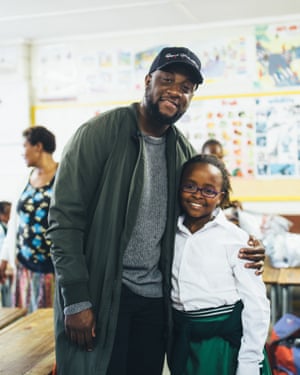
Ladi Kazeem never really stops working. The 30-year-old entrepreneur wakes up at 6am and doesn’t stop trading vintage T-shirts until he goes back to bed. “If you post a picture on Instagram, the British will see it when you’re awake, the Americans will see it when you’re about to go to sleep, and the Japanese will see it when you’re waking up,” he says. “It never really stops.”
With 181,000 followers on the e-commerce site Depop, Kazeem is a verified “top seller” – someone who consistently lists and sells – and has seen his business take him around the world. From whistle-stop tours of Europe to thrifting in America, there are few places he hasn’t been to seek out the rarest and most valuable clothes. The T-shirts he’s sold have even found their way on to the backs of celebrities such as Kanye West and Kendall Jenner.
But if it hadn’t been for his business, things could have gone another way for Kazeem. After his mother died when he was just 17, Kazeem found himself “effectively homeless” and roaming the streets of northern England, struggling to find work. His experience has shown him just how key business can be in bridging the economic divide. “There are not many black businesses in the north. That’s just a fact,” he says. “The transition into e-commerce that’s happened over the past 10 years has given everybody a platform. It doesn’t matter who you are, it matters what you’re putting out there.”

Kazeem’s story, like that of many black entrepreneurs, shows how crucial business can be in providing opportunity and driving equality. Black Lives Matter has helped accelerate the need to address economic injustice and increase investment in black commerce. PayPal has pledged $530m (£408m) to support black businesses and communities in the US and beyond. And closer to home, businesses celebrated Black Pound Day on 3 October – a campaign that started in June, which will be running on the first Saturday of every month – with shoppers encouraged to spend cash at black-owned firms.
“If we truly want equality in society, there needs to be a fairer distribution of capital,” says William Adoasi, 30, founder and lead designer of Vitae London, a watch brand that supports children with schooling in sub-Saharan Africa. He was inspired to start the business and pursue social justice by his father, who was the first in his family to be able to read and write.
Adoasi says business can be a powerful tool in helping black people who are disadvantaged: “If there were more black businesses that were thriving, and if the black pound was circulating more, then if an issue rises up within our community, we can give the answer to it.”
Joycelyn Mate and Rachael Corson – the founders of Afrocenchix, which specialises in natural afro hair products – also understand the importance of black business and the barriers that young black entrepreneurs face. The pair, both 30, met 10 years ago at the University of Birmingham. Working from the kitchen of their university halls, with just £50 each, they set out to create products that would be perfect for black women. Their company is now valued in the millions.
Corson says their chances of securing funding felt like it was “less than one in 10,000”, but while they have faced challenges due to their background, they’ve been able to tap into the black community in a way nobody else has.
“We started doing events and focus groups and we found that if we stood on a stage and told people the stuff we knew, people would literally queue up for an hour to speak to us and buy out all our stock,” she says. “People needed to see someone who looked like them and who shared the same problems.”
As well as providing opportunity, addressing inequality and tapping into underrepresented communities, black business can also be a tool to advance political issues. Fisayo Longe, 28, the founder and creative director of Kai Collective, a London-based womenswear brand, uses her company to promote issues affecting black women.
“Where I come from [Nigeria], some women are not ready to embrace their power and realise that they’re equal and can achieve anything,” she says. “They’re raised to aspire to marriage and seek approval from men. I wanted to use clothing to build a community and make women feel beautiful and confident, and then realise their power.”
Longe was recognised by Beyoncé on a list of black brands to support, and believes initiatives such as Black Pound Day have brought awareness to black-owned business. But, ultimately, she looks forward to the day when it will no longer be needed: “I hope that we get to the stage where a black-owned business is just a business like any other.”
This is something Kazeem echoes: “We should be recognising all businesses from all ethnicities, but at the same time realising that these businesses are here all year round and can be supported all year round.”
But at the moment, the opportunities that black commerce can provide and the role it plays in tackling inequality make it clear just how important it is to support businesses now – and beyond.
Whether local or global, PayPal connects businesses with more than 346 million customers around the world. Learn more at paypal.com/uk
from Lifestyle | The Guardian https://ift.tt/3emUEKZ
via IFTTT

comment 0 Comment
more_vert